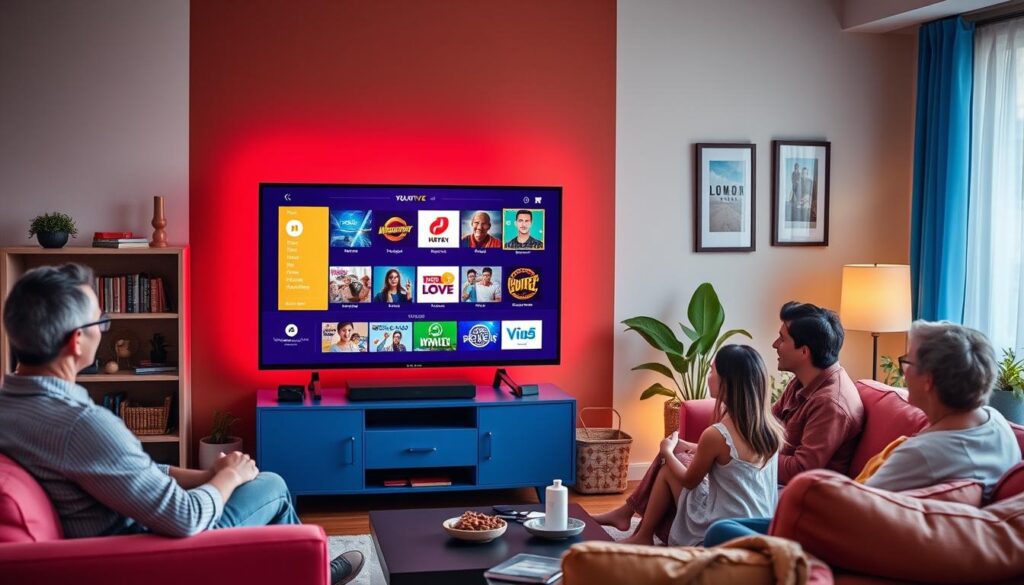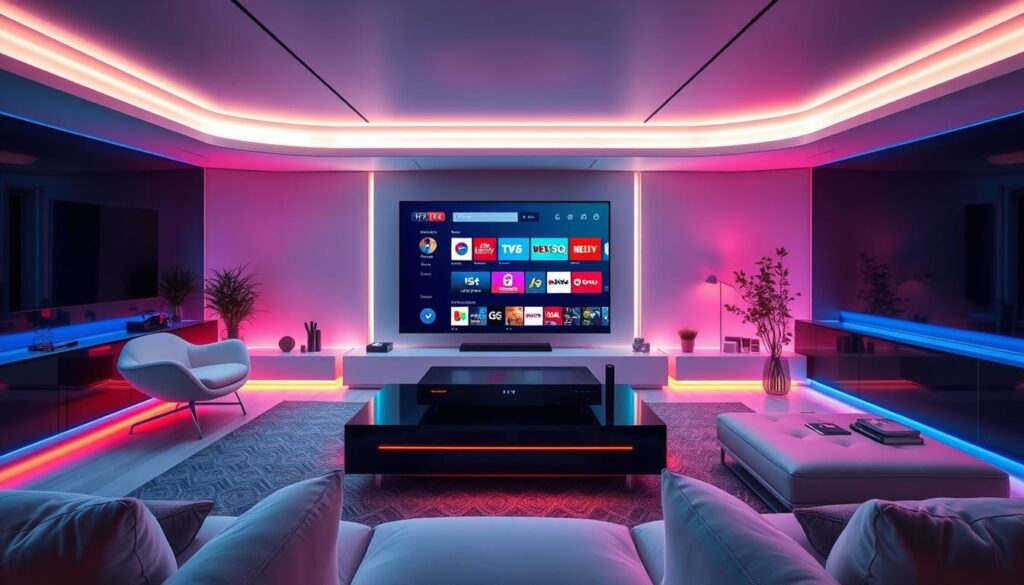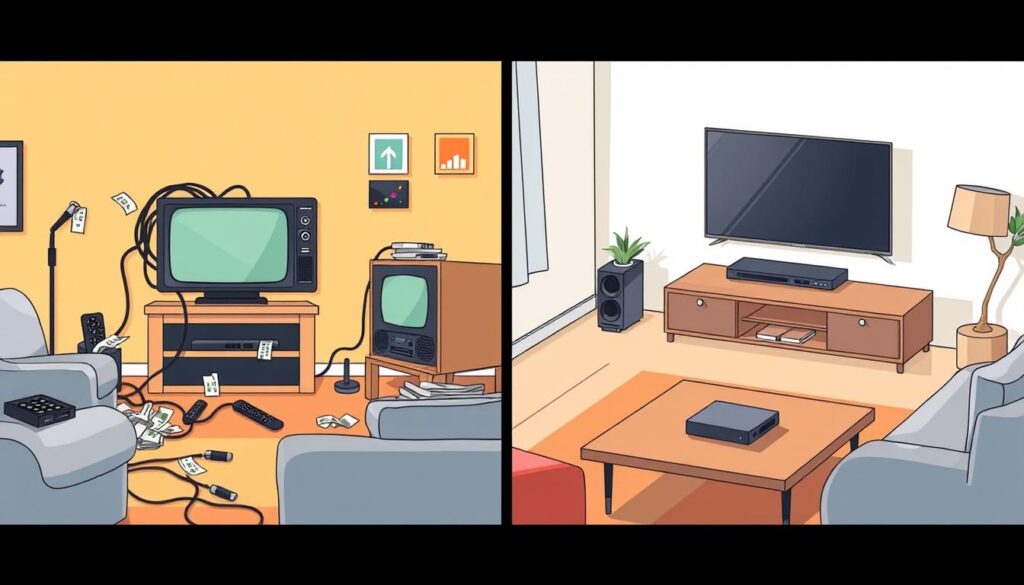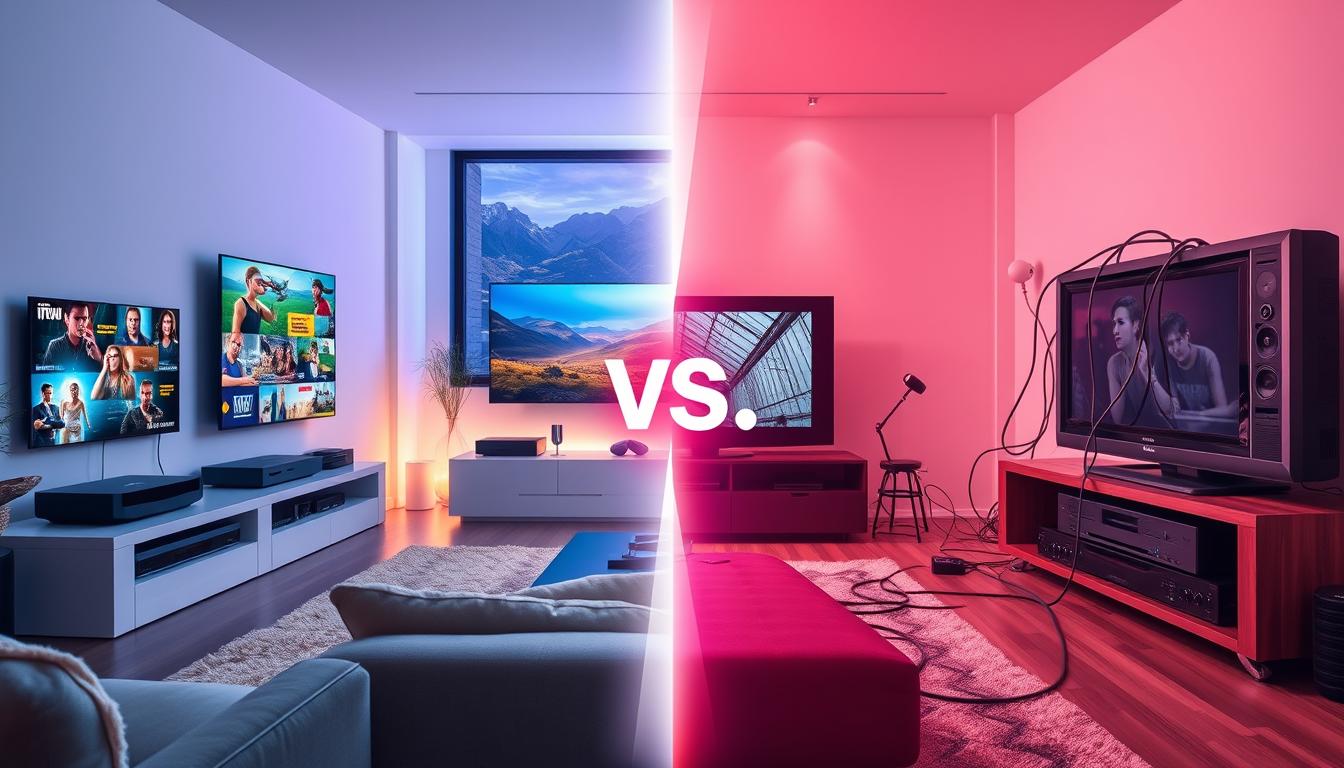The TV industry is changing fast, with many talking about iptv vs. cable tv. Streaming is making a big impact on how we watch shows. More people are choosing streaming for its ease and flexibility over old cable tv.
Looking ahead, streaming is a big deal for TV’s future. It’s important to know the good and bad of each choice. Streaming is shaping the future of TV, making it more exciting and accessible.
Key Takeaways
- The television industry is undergoing a significant transformation
- Streaming is revolutionizing the way we consume entertainment
- Iptv vs. cable tv: why streaming is the future in 2025 is a key consideration for consumers
- The future of television is closely tied to the growth of streaming services
- Streaming services offer flexibility and convenience over traditional cable tv
- The rise of streaming services has led to a shift in consumer behavior
The Evolution of Television: From Cable to Streaming
Television has changed a lot over the years. It moved from traditional cable TV to IPTV and streaming services. These changes have made TV more accessible and affordable, which are big iptv benefits. But, traditional cable TV has its downsides, like fewer channels and higher costs.
The move to streaming services is driven by streaming tv trends. These trends focus on ease, flexibility, and saving money. So, more people are choosing IPTV and streaming over cable TV. This trend is likely to grow as more people see the benefits of IPTV and streaming.

- Increased accessibility: IPTV and streaming services can be accessed from anywhere, at any time, using a variety of devices.
- Affordability: IPTV and streaming services often offer more affordable pricing options compared to traditional cable TV.
- Personalization: IPTV and streaming services provide users with personalized content recommendations, enhancing their viewing experience.
As TV keeps changing, IPTV and streaming services will become even more important. They offer many benefits, making streaming tv trends popular. At the same time, the drawbacks of cable tv disadvantages are becoming clearer.
| Service | Accessibility | Affordability | Personalization |
|---|---|---|---|
| IPTV | High | Affordable | Personalized recommendations |
| Streaming Services | High | Affordable | Personalized recommendations |
| Traditional Cable TV | Limited | Expensive | Limited personalization |
Understanding IPTV Technology
IPTV technology has changed how we watch TV. More people are choosing internet streaming TV over traditional TV. IPTV uses the internet to send TV shows and movies to viewers. It has gotten better, offering better quality, easier access, and more channels.
IPTV lets users pick what they want to watch. Unlike cable TV, which has a fixed list of channels, IPTV has many options. You can watch live TV, movies, and shows on demand. This makes IPTV a great choice for those who want to cut the cord.

- High-definition streaming
- Multi-device support
- On-demand content
- Personalized recommendations
These features make IPTV a good choice for those wanting a flexible and affordable TV option. It’s better than traditional cable TV in many ways.
IPTV is the future of television, offering a more personalized and flexible viewing experience. With its advanced technology and wide range of content, it’s no wonder that more and more people are turning to IPTV for their entertainment needs.
The Current State of Cable TV Services
Cable TV has been a key part of home entertainment for years. But now, it’s facing competition from streaming services. The cable tv vs. streaming performance debate is heating up, with each side having its own strengths and weaknesses. Cable TV’s infrastructure can lead to outages and limited coverage.
Cable TV used to offer a wide range of channels and content. But, the rise of streaming services has changed how we watch TV. Many people now prefer streaming vs traditional tv viewing habits. This shift has led to fewer cable TV subscriptions, as people look for cheaper and more flexible options.
Here are some key differences between cable TV and streaming services:
- Price: Streaming services are often cheaper than cable TV, with more flexible pricing plans.
- Content: Streaming services offer a wide range of content, including original programming and on-demand movies and TV shows.
- Availability: Streaming services are available on a range of devices, including smartphones, tablets, and smart TVs.

The cable TV industry is in a period of change, adapting to new consumer habits and technology. As the streaming vs traditional tv viewing habits debate continues, it will be interesting to see how cable TV evolves to stay competitive.
| Service | Price | Content | Availability |
|---|---|---|---|
| Cable TV | Varies | Wide range of channels | Limited to TV |
| Streaming Services | Cheaper | Original programming and on-demand content | Available on multiple devices |
Cost Comparison: IPTV vs Cable TV in 2025
When looking at streaming tv trends, cost is key. IPTV and cable TV charge differently. IPTV usually has a subscription fee that changes based on the provider and package.
Cable TV, on the other hand, often requires a contract. It also might have extra fees for equipment and installation. The future of television will likely be influenced by these pricing models. This is because people are looking for cheaper options.
Here’s a look at the costs for IPTV and cable TV:
| Service | Monthly Fee | Equipment Cost | Installation Fee |
|---|---|---|---|
| IPTV | $20-$50 | $0-$100 | $0 |
| Cable TV | $50-$100 | $100-$200 | $50-$100 |
The table shows IPTV is cheaper than cable TV. IPTV has lower monthly fees and no installation costs. This makes IPTV a great choice for those wanting to save money on streaming tv trends and the future of television.
Quality and Performance Showdown
When comparing IPTV and cable TV, the debate often centers on quality and performance. Many have switched to IPTV for its cord-cutting benefits. The main reason is the streaming quality.
IPTV streams in high definition with little buffering, attracting many viewers. Cable TV, on the other hand, can have signal loss and poor picture quality. IPTV also wins in reliability, with fewer outages and interruptions.
Streaming Quality Comparisons
IPTV offers a smoother viewing experience compared to cable TV. It lets users watch their favorite shows and movies in high definition. IPTV’s ease of use and accessibility add to its appeal.
Reliability Metrics
IPTV is more reliable than cable TV. It provides uninterrupted viewing, avoiding signal loss and outages. This makes IPTV a better choice for uninterrupted content enjoyment.
User Experience Factors
IPTV’s user experience is a big plus. It allows easy channel navigation, on-demand content access, and interactive features. Its flexibility and convenience make it a favorite among viewers.
Content Availability and Programming Options
IPTV benefits are many. It offers a wide range of channels, including live TV and on-demand content. This is different from cable tv disadvantages, which often have fewer channels and cost more.
Some key advantages of IPTV include:
- Increased accessibility: IPTV can be accessed from anywhere with an internet connection. It’s perfect for watching TV on your own schedule.
- Affordability: IPTV is often cheaper than traditional cable TV. Many providers offer good prices and flexible plans.
- Personalization: IPTV lets users customize their viewing experience. They can create personalized channels and playlists.
In addition to these benefits, IPTV offers a variety of programming options. This includes:
IPTV is becoming more popular because of its wide range of channels and content. It provides a unique and personalized viewing experience. This is something traditional cable tv disadvantages can’t match.
The Impact of 5G on IPTV Services
5G technology is changing IPTV services a lot. It brings better speed, coverage, and streaming. Now, users get to enjoy smooth and high-quality streams. The latest trends show a move towards faster and more reliable connections, thanks to 5G.
Some key benefits of 5G for IPTV services are:
- Enhanced speed: 5G offers faster data transfer, making streaming smoother and more efficient.
- Expanded coverage: 5G networks cover more areas, reducing signal loss and ensuring a stable connection.
- New streaming capabilities: 5G supports new tech like 4K and 8K resolution, and immersive experiences like VR and AR.
Speed Improvements
5G’s increased speed is a big plus for IPTV. It means faster buffering and less latency. So, users can watch their favorite shows and movies without any breaks or delays.
Coverage Expansion
5G’s wider coverage lets users access IPTV services anywhere. This is great for those in rural or remote areas where cable TV might not reach.
| Technology | Speed | Coverage |
|---|---|---|
| 4G | 100 Mbps | Limited |
| 5G | 1 Gbps | Wider |
New Streaming Capabilities
5G brings new streaming features to IPTV. It supports 4K and 8K resolution and immersive experiences like VR and AR. This means users can have a more engaging and interactive viewing experience.
Customization and Personalization Features
The future of television is all about giving viewers a personalized experience. Streaming services let users customize their viewing to fit their tastes. When comparing streaming services, IPTV and cable TV show different levels of customization.
IPTV offers features like user profiles, content recommendations, and parental controls. These let users tailor their viewing to their interests. Cable TV, on the other hand, has limited options, with most users stuck with pre-set channels.
As TV evolves, we’ll see more advanced customization features. AI and machine learning will help streaming services give users even more tailored content. This makes the viewing experience more enjoyable. When comparing streaming services, customization and personalization are key.
In conclusion, customization and personalization are key in the future of television. We want to tailor our viewing to our preferences. Streaming services, like IPTV, make this possible. This makes the streaming services comparison even more important.
Global Accessibility and Geographic Restrictions
iPTV makes streaming services more available and affordable worldwide. Cable TV, on the other hand, has limited channels and high costs. These can make it hard for people to access.
iPTV breaks down geographic barriers, letting users watch content from anywhere. This is great for expats or those in areas with few cable TV options.
Regional Content Differences
Cable TV faces challenges with regional content, having limited control over what’s available. But, iPTV offers a wide range of content for different regions. This makes it more personalized for users.
International Streaming Rights
International streaming rights can be tricky. But, iPTV providers are often better at handling these issues. They partner with content providers worldwide, offering a diverse range of content.
VPN Compatibility
VPN compatibility is key for iPTV users. It ensures secure and private streaming. Many iPTV providers offer VPN-compatible services. This lets users access content worldwide while keeping their online security.
Environmental Impact and Sustainability
Switching from cable TV to IPTV is a big step. It’s important to look at how each affects the environment. Cable TV uses a lot of energy, which harms the planet. On the other hand, IPTV is better for the environment because it uses less energy.
Recently, streaming tv trends have moved towards being more green. This means using less power and reducing waste. IPTV is leading the way with its eco-friendly practices. Some of the main advantages of IPTV are:
- Lower energy consumption
- Reduced e-waste generation
- Smaller carbon footprint
As IPTV becomes more popular, thinking about its impact on the planet is key. Choosing IPTV helps make the entertainment world greener.
Market Trends and Future Projections
The move towards iptv technology is growing fast. More people are choosing cord-cutting for its benefits. This trend is likely to keep going, thanks to the need for flexible and affordable entertainment.
Several factors are pushing this trend forward:
- Streaming quality has improved, making watching shows smoother.
- iPTV is now available on many devices, making it easier to access.
- It’s also cheaper, with lots of affordable packages to choose from.
As the industry grows, we’ll see even better iptv technology. This includes more personalization and interactive features. The benefits of cord-cutting will also draw in more viewers, eager to leave behind old cable TV ways.
The future of entertainment is all about technology and what people want. As iptv gets better and more widespread, how we watch shows will change a lot.
The traditional cable TV model is being challenged by iptv. New chances are opening up for companies that are ready to innovate. By focusing on iptv’s benefits, these companies can lead the way in the streaming world.
Conclusion: Making the Switch from Cable to IPTV
The future of TV is all about IPTV. Cable TV has been the top choice for years, but IPTV is changing the game. It offers better quality, more control, and access to content worldwide.
IPTV is set to take over from traditional cable TV soon. With 5G networks growing and streaming getting better, IPTV’s appeal will only grow. If you want a more flexible and exciting TV experience, now is the time to switch to IPTV.
FAQ
What are the main benefits of IPTV compared to traditional cable TV?
IPTV is more accessible and affordable than cable TV. It uses the internet to deliver content, making it cheaper and more available. IPTV also offers a personalized viewing experience with features like on-demand content and user profiles.
How does the quality and performance of IPTV compare to cable TV?
IPTV can deliver high-definition and even 4K content, improving streaming quality. Its performance is reliable, thanks to better internet and streaming technology. However, quality can vary based on internet speed and network congestion.
Cable TV has consistent performance but may not keep up with the latest video quality standards.
What are the content availability and programming options for IPTV compared to cable TV?
IPTV offers a wide range of content, including more channels and on-demand options than cable TV. It provides a diverse selection of content, including niche channels and international programming. Cable TV, however, is often limited by its channel packages.
How does the cost of IPTV compare to cable TV in 2025?
In 2025, IPTV is expected to be much cheaper than cable TV. IPTV services offer more affordable subscription packages, using the internet to deliver content at a lower cost. IPTV also eliminates the need for expensive cable boxes and installation fees.
What is the impact of 5G technology on IPTV services?
5G technology will significantly impact IPTV services. It will bring faster speeds, lower latency, and expanded coverage. This will improve the streaming experience, making IPTV even more attractive than traditional cable TV.
5G will also enable new streaming capabilities, such as immersive experiences and multi-device viewing, driving IPTV adoption.
How does the global accessibility and geographic restrictions differ between IPTV and cable TV?
IPTV is more globally accessible than cable TV, available anywhere with an internet connection. However, it may face some geographic restrictions due to licensing agreements. Cable TV is limited to specific regions and requires physical infrastructure like cable lines.
What are the environmental impact and sustainability considerations for IPTV and cable TV?
IPTV is more environmentally friendly than cable TV. It has a lower energy consumption and carbon footprint, not needing the same physical infrastructure and hardware. IPTV also reduces e-waste by eliminating bulky cable boxes and equipment.
Cable TV requires more energy-intensive infrastructure and generates more electronic waste. As sustainability becomes more important, IPTV’s environmental impact will be a significant advantage over cable TV.

Leave a Reply